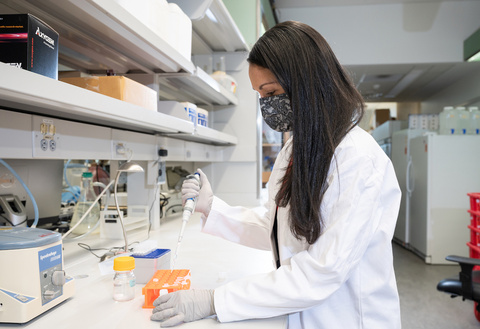Renata Pereira Alambert, PhD, researches mechanisms to counteract obesity and associated disorders, such as diabetes and cardiovascular disease.
“This research is important to me because of its potential to benefit our society in general, but also, because metabolic diseases such as diabetes, have impacted my family directly,” Pereira says.
Pereira, a member of the Fraternal Order of Eagles Diabetes Research Center (FOEDRC), wants to better understand ways in which the body can increase its metabolism to prevent the effects of those diseases—her studies focus on special fat cells called brown (or beige) fat cells.
She has used her knowledge of the sciences to mentor and teach young students from Brazil to the United States.
“Even though I’m not from the most advantaged background, I had supportive parents, who believed in me. I was always encouraged to study and reach for more, and that made a huge difference in my life,” Pereira says.
Giving back
Periera has been with the UI Health Care for eight years, and within the last year, transitioned into the role of assistant professor. She dedicates her time, both inside and outside UI Health Care, to inspiring underrepresented students in STEM. She has mentored undergraduates, graduate students, and fellows from diverse cultural backgrounds.
“It’s important to pay it forward by investing time and hopefully inspiring these trainees to work hard and achieve their goals,” she says.
She is also engaged in three different programs that promote diversity in the sciences. These programs have created a network for minorities in the sciences, and allow their participants to reach out to each other for support and to celebrate each other’s successes.
“The larger goal is for me to be an ambassador and to reinforce my commitment in increasing diversity and representation in science,” she says.
Pereira is originally from Brazil, where she volunteered her time mentoring kids from disadvantaged neighborhoods who wanted to get into college. She helped students specifically with biology and sciences for their exams, but also served as a role model and support system.
Additionally, Pereira has taught classes in public schools in poor communities in Brazil, including the school she attended as a young girl.
“When I began teaching, I had just completed my PhD, which was so out of the ordinary for my students in Brazil,” she recalls. “It was humbling to be able to serve as an example to those students.”
Looking up to leadership
Recently, she was named to a list of 1,000 Inspiring Black Scientists, compiled by Antentor O. Hinton Jr., PhD, postdoctoral research fellow.
“I felt honored to be included in this list alongside so many people I know and respect,” Pereira says.
Pereira is an involved mentor, but she also has mentors of her own. For many years, she has looked up to Dale Abel, MD, PhD, chair of the Department of Internal Medicine and director of the FOEDRC.
“He’s from Jamaica, so he understands really well what it means being an immigrant in America and in the sciences,” she says.
Abel, who was also named to the 1,000 Inspiring Black Scientists, has been influential in Pereira’s career in many ways, including opening the doors for her to study in the U.S.
“I know how important it is to have someone championing you, and giving you an opportunity. I am committed to doing the same for other aspiring scientists,” Pereira says.

